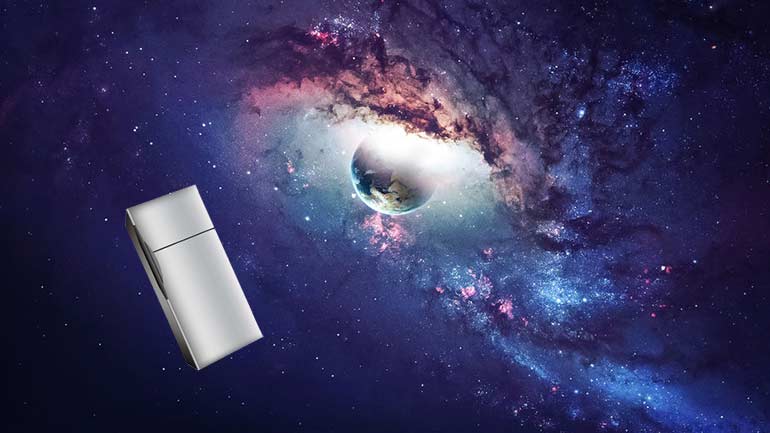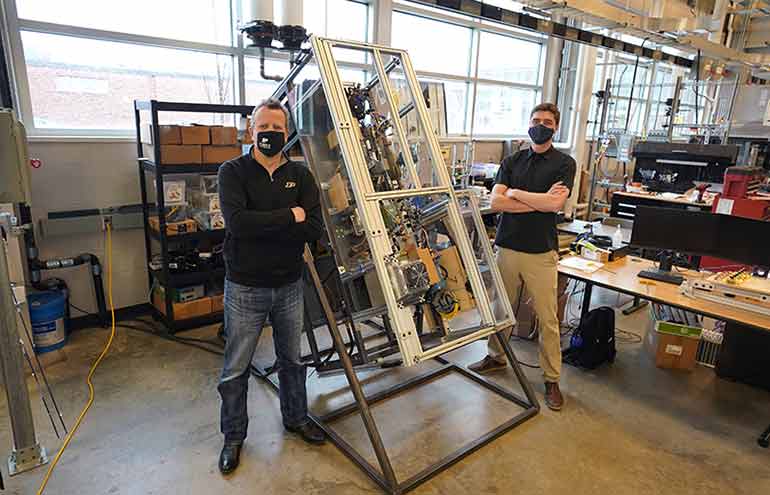Fridges in space
17th April 2021
USA: Refrigeration engineers are developing a vapour compression fridge that will work at zero gravity and in different orientations to provide longer-lasting and more nutritious food for astronauts.
The canned and dried foods that astronauts currently eat during missions have a shelf life of only about three years. The team’s project, funded by NASA’s Small Business Innovation Research (SBIR) programme, aims to give astronauts a supply of food that could last five to six years.
Even though fridge experiments have been made in space before, they either didn’t work well enough or eventually broke down. Cooling systems currently on the International Space Station are used for experiments and storing biological samples rather than for storing food, and, with a COP of just 0.36, consume significantly more energy than fridges on Earth.
A team of engineers from Purdue University, Air Squared Inc and Whirlpool Corporation is aiming to design a fridge that could be sent into space ahead of a mission and operate at freezer temperatures to meet the needs of astronauts. To do so, it needs to work in zero gravity – or upside down if oriented that way when a spacecraft lands on another planet.
“In a typical fridge, gravity helps to keep liquid and vapour where they are supposed to be. Similarly, the oil lubrication system inside of a fridge’s compressor is gravity-based. When bringing new technology into space, making the entire system reliable in zero gravity is key,” explained Leon Brendel, a Purdue PhD student in mechanical engineering.

Overcoming the zero gravity problem and its effect on the flow of oil throughout fridge has been addressed with the use of an oil-free scroll compressor developed by Colorado-based company, Air Squared, a specialist in oil-free scroll solutions. The compressor will be tested both in the prototype and in its larger, more instrumented counterpart built by Purdue researchers.
Air Squared has been working with patented integrated scroll compressor-expander technology where the scroll compressor and expander operate on a common shaft, allowing a single semi-hermetic shell to be used for all rotating components.
“No gravity means that oil isn’t flowing where it should. Our design provides a higher reliability by not requiring oil in the compressor so that the fridge can run for a long period of time and not be challenged by a microgravity environment, where oil might leave the compressor, become trapped in the system and render the compressor inoperable,” said Stephen Caskey, a project engineer at Air Squared, principal investigator for the team’s NASA SBIR award and an alum of Purdue’s School of Mechanical Engineering.
The engineers have built three experiments to test the effects of microgravity on a new oil-free fridge design: a prototype for potential future use on the International Space Station, a setup for testing the prototype’s vulnerability to liquid flooding and a larger version of the prototype with sensors and instruments to capture how gravity affects the vapour compression cycle.
Next month, the team will test their fridge design on a weightless research lab operated by Zero Gravity Corporation. Based in Dumfries, Virginia, Zero Gravity Corporation operates weightless flights from United States airports.
The specially designed plane will fly in microgravity dozens of times – for 20-second intervals – during each of four flights. Data from these flights, which are supported by NASA’s Flight Opportunities programme, will help the team determine if the design is ready to be used in space.
“During the last two years of this project, we have made tremendous strides in moving the technology forward,” said award-winning professor, Eckhard Groll, the head of Purdue’s School of Mechanical Engineering. “If these parabolic flights check out as we imagine they will and prove our system works in microgravity, we’re just a couple years away from having a refrigerator for spaceflight. We’re excited to provide the refrigerator for that flight. I think we have all the tools in place to do so.”
Brendel and Paige Beck, a Purdue junior majoring in mechanical engineering, and three other members of the team from Air Squared will be flying with experiments testing various aspects of the fridge design.






